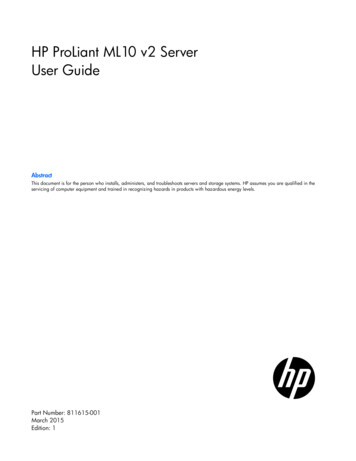
Transcription
ETSMSYS:FRO WEOP,TTSUAFPRRUOU G OGNNIIRLULTACCRE TRUSERFEBRUARY 24, 2017THE WILLIAM &IDA FRIDAY CENTERCHAPEL HILL, NCMINORITYHEALTH.WEB.UNC.EDUERU
WHAT ARE YOUR GOALS FOR TODAY?
SYSTEMS OF POWER:RECALLING OUR PAST,RESTRUCTURING OUR FUTUREPresented by the UNC Minority Student Caucusand the Gillings School of Global Public HealthTABLE OF CONTENTS2016-2017 MHC Planning Committee . 2American Public Health Association Letter . 3Welcome . 4Webcast Partner Conferences and Groups . 6Conference Center Map . 7Conference Agenda . 819th Annual William T. Small,Jr Keynote Lecture:Chandra L. Ford, PhD, MPH, MLIS Abstract and Biography . 106th Annual Victor J. Schoenbach Keynote Lecture:Robert E. Fullilove, EdD Abstract and Biography . 11Closing Keynote Lecture:Amy Locklear Hertel, PhD, JD, MSW Abstract and Biography . 12Breakout Sessions . 13Speaker Biographies . 18Conference Exhibitors . 23NC DHHS Office of Minority Health and Health Disparities . 251
2016-2017 MINORITY HEALTHCONFERENCE PLANNING COMMITTEEConference Co-ChairsJani RadhakrishnanMarisa MartiniPlanning CommitteeCoordinatorKyle NisbethCommunications Committee*Melissa Luong*Deanna PugliaAllison Marie BalmesErin BurksChannon ConnerEmily DonovanLeiana EdwardsJulia HuEsther Youjin LeeKirsten LeloudisDianna PadillaDaijah StreetSancta St. CyrEvaluation Committee*Venita Embry*Sheila PatelMikaela FreundlichMichelle HuangKelsey KnightSaradine PierreBrittany SchwartzReana ThomasExhibitors Committee*Julie Sunderman*Gar YeungKathy ChanAmanda KoteyKrista LinaresAt-Large VolunteerCoordinatorsAlexis HoytNithi Suresh2Posters Committee*Kaitlyn Brodar*Ida GriesemerMersedes BrownKathy ChanJames ColemanGracelyn CrudenMichelle HuangShynah JamesMary KoenigMeagan MeekingsAllie MunsonJhenielle ReynoldsBlythe RhodesBrittany SchwartzSpeakers Committee*Meredith Burns*Caitlin NelliganCherese BeattyCaroline EfirdCamille FulbrightAdante HartMichelle HuangKate LeMastersArumina PunjalaClaire SadeghzadehChristine WalshWebcast Committee*Shekinah Fashaw*Jazra StandleyTaylor AlfonsoJordan DrakeGeard FossettJhenielle ReynoldsKaren SummersNayira WarrenFundraising Committee*Sahana RaghunathanCarly CannoyKeely KrihoMisbah NoorJhenielle ReynoldsBrittany WiafeGraphic DesignerKaley HustonAdvisersGillings School ofGlobal Public HealthSterling FriersonOffice of External AffairsChandra CaldwellStaff Advisor,Minority Student CaucusLinda KastlemanPublic Communications SpecialistOJ McGheeInstructional Media ServicesNatiaya NealBusiness Services ManagerDavid PesciDirector of CommunicationsDr. Victor SchoenbachMinority Health ProjectCharletta Sims EvansAssistant Dean of Student AffairsNorth Carolina Instituteof Public HealthKathy CheekBusiness ManagerCherelle WhitfieldProgram ManagerJessica SouthwellPractice and Policy AnalystBecky HartWeb Designer*Denotes Committee Co-Chairs
AMERICAN PUBLIC HEALTHASSOCIATION LETTER3
WELCOME TO THE 38TH ANNUALMINORITY HEALTH CONFERENCEOn behalf of the Minority Student Caucus, the Minority Health Conference PlanningCommittee, and the Gillings School of Global Public Health at the University of NorthCarolina at Chapel Hill, we welcome you to the 38th Annual Minority HealthConference.This year we have the honor of celebrating 38 years of student organizing. Beginningin 1977, the conference has been a vehicle for students at Gillings to explore publichealth issues of importance to all minority communities. This conference recognizesthat power must be distributed equitably for people of all colors, genders, sexualpreferences, abilities, income, education level, age, etc. to experience healthy and fulllives to the greatest extent. The Minority Student Caucus was established to representand support minority students, and the conference is an opportunity for these studentsand their allies to learn about and discuss pressing issues in our field. Over the years, theconference has grown in size, length, and complexity, providing a platform forstudents, academics, and community practitioners to explore a multitude of issuescontributing to health inequities among diverse populations. Given the mission and therich history, it is truly our honor to carry forth the legacy of this conference.This year’s theme is “Systems of Power: Recalling Our Past, Restructuring Our Future”. As our nation faces crucialconversations about race and justice, we want to explore power’s role in public health. Our conference will approach“power” as not solely good or bad, but rather, define power by who has it, what people choose to do with it, and thesystems and structures that influence those decisions. In addition, our theme acknowledges the impact that history hashad on the health of historically marginalized and oppressed groups and encourages a call to action! You’ll notice thatwe eliminated the word “health” from our theme, and this was intentional. We believe that many different types ofprofessionals work to better the lives, health, and well-being of individuals. Therefore, we hope that this conference hasattracted the most interdisciplinary group of presenters, exhibitors, funders, and participants to engage in cross-learningand dialogue across fields as we all recognize our common goal.Over the past year spent planning the Minority Health Conference, we have been able to build off of last year’s successes aswell as add new, interactive elements to this year’s conference. Here are some of the highlights:This year the Minority Health Conference will feature our first ever closing keynote, Dr. Amy Locklear Hertel, theDirector of the American Indian Center at UNC.Breakout sessions include engaging, action-oriented workshops and panels so that more voices from the community canbe heard and so attendees can develop tangible skills that they can bring back to their communities. This year we havetwo workshops for attendees to participate in, “Reshaping Patterns of Power: A Racial Equity Institute Workshop” and“Meditation as a Form of Empowerment Workshop.”We have partnered with Healthy Girls Save the World and NC Scholars’ Latino Initiative to sponsor middle and highschool students to attend the conference so that youth in our community can begin engaging with these important,complex public health issues early and become champions for health equity within their communities.4
WELCOME TO THE 38TH ANNUALMINORITY HEALTH CONFERENCEDue to the unprecedented number of conference participants, we will be having our first ever UNC on-campus groupviewing in order to continue to expand the conference’s reach and engage more students across UNC’s campus. Ouron-campus group viewing is located at the Sonja Haynes Stone Center for Black Culture and History and will feature abroadcast of Dr. Chandra Ford’s morning keynote, live Q & A, and a moderated discussion.Before our afternoon and closing keynote speakers we will be having performances from Ebony Readers/Onyx Theatre(EROT), UNC’s premier spoken word collective.We provided pronoun tags so you can display your own gender pronouns and easily see others. Throughout thisconference, we request that you use the pronouns displayed by your fellow attendees.In an effort to ensure all feel welcome, we wanted everyone to be made aware of two gender-neutral bathroomslocated upstairs in the Friday Center. There will be signs posted throughout the Friday Center to direct attendees to thelocation of these bathrooms. We also ask that attendees please trust that each individual knows which bathroom is mostappropriate and comfortable for them to utilize.Be sure to visit our social media room where you can tell us why you’re excited about the conference, take Instagramphotos, and #MHC2017!The delivery of this conference would not have been possible without our creative and intelligent supportive planningcommittee from departments across UNC! We truly appreciate the hard work and dedication of our subcommittee chairsand volunteers, showcasing how students can come together to present a high-quality conference of this magnitude.Thank you to our new and long-standing conference sponsors that have assisted us in creating a sustainable conferencefrom year to year. We also would like to specifically thank Dean Barbara K. Rimer and the Dean’s Office at the GillingsSchool of Global Public Health for their continued support, Assistant Dean Charletta Sims Evans and Ms. ChandraCaldwell, our staff advisors; Ms. Cherelle Whitfield and the NC Institute for Public Health for providing logistical support;Dr. Victor Schoenbach for his continued support of the conference and webcast; O.J. Mcgee for production of the webcast,Ms. Becky Hart for website management, Ms. Kathy Cheek for budget management, and Sterling Frierson for his assistancein raising funds for this event. Without their valuable guidance and words of encouragement, the logistics and sustainabilityof this conference would not be possible. Please join us in thanking them throughout the day.Finally, we would like to thank each of you for your support of the conference. Whether it is your first time joining us oryou are a long time supporter, we hope you enjoy this year’s conference and leave with renewed enthusiasm for takingaction toward dismantling structural and systemic oppression in your personal and professional endeavours.Marisa Martini and Jani Radhakrishnan2017 Minority Health Conference Co-ChairsUniversity of North Carolina at Chapel HillGillings School of Global Public Health5
2017 19TH ANNUAL WILLIAM T. SMALL JRKEYNOTE LECTURE WEBCASTWe would like to extend a special welcome to our partner conferences that participate in the William T. Small Jr. KeynoteLecture via online broadcast and have organized local events or conferences in conjunction with our conference. We arethrilled to have these additional student and community groups join the conference in this manner, as it illustrates theimportance and awareness of minority health issues at a national level.WebcastModeratorGeard Fossett, MHA Candidate, Department of Health Policy and Management,Gillings School of Global Public HealthPartner ConferencesColorado School of Public HealthAurora, ColoradoInaugural On-Campus ViewingUniversity of North Carolina at Chapel Hill,The Sonja Haynes Stone Center for BlackCulture and HistoryChapel Hill, North CarolinaGroup ViewingsCarrboro High SchoolCarrboro, NC USACityMatCH/University of Nebraska Medical CenterOmaha, Nebraska, USADepartment of City and Regional Planning, UNCChapel Hill, NCVCU Libraries, Tompkins-McCaw Library for theHealth SciencesRichmond, VA USAInter-Tribal Center for Social Change (ICSC)Cullowhee6UIC Minority Students for theAdvancement of Public HealthChicago, Illinois, United StatesAmerican Institutes for ResearchChapel Hill, NC OfficePrevention PartnersChapel Hill, NCBlue Ridge HealthHendersonville, NC USA
CONFERENCE MAP7
CONFERENCE AGENDATime8:00 AMEventCheck-in/Continental Breakfast9:00 AMWelcome by Conference Co-ChairsMarisa Martini and Jani Radhakrishnan9:10 AMWelcome and History of the Conference bySamuel Baxter and April Aviles, MinorityStudent Caucus Co-Presidents9:20 AMWelcome by Chancellor Carol Folt9:25 AMWelcome by Dean Barbara K. Rimer9:30 AMWelcome by Dr. Rumay G. Alexander9:35 AMIntroducing the 19th Annual William T. Small Jr.Keynote Speaker Dr. Chandra Ford9:40 AM19th Annual William T. Small Jr Keynote Lecture:Chandra L. Ford, PhD, MPH, MLIS10:45 AMPoster Presentations and Exhibitors*6 posters will be located in breakout session rooms (seebelow)Poster Title8LocationCentral AtriumGrumman AuditoriumWillow and AtriumRoomPublic Health Students Organize: “We Gon’ Be Alright: AddressingRacism and Anti-Black Violence as a Public Health Crisis” - AStudent-Led Course grounded in an intersectional approach to informPublic Health PraxisRedbud ABFanning a Flame: How workforce diversity efforts have sparked arevolution in nursing education at Duke University School of NursingRedbud ABModel for a Student Driven and Administration Supported MedicalSchool Social Justice InitiativeRedbud ABThe power of youth and resources: employing youth to inventorycommunity assetsRedbud ABThe Power of Youth Voices: Engaging Latino Immigrant Youth inAnalyzing Systems and Power Through PhotoVoiceDogwood AB#SodaKills: Youth driven activism to counter the predatory marketingof big soda companies in disenfranchised communitiesDogwood AB
CONFERENCE AGENDATimeEventLocation11:00 AMMorning Concurrent Breakout SessionsMeditation as a Form of Empowerment WorkshopPower in Borders: Injustices Facing MigrantsPower in PracticeArt as Activism and Liberation12:00 PMPoster Presentations and Exhibitors*12:30 PMLunch1:25 PMEROT Performance1:30 PMIntroducing the 6th Annual Victor J. SchoenbachKeynote Speaker Dr. Robert Fullilove1:35 PM6th Annual Victor J. Schoenbach Keynote Lecture:Dr. Robert Fullilove, EdD2:30 PMPoster Presentations and Exhibitors*3:00 PMAfternoon Concurrent Breakout SessionsRedbud ABDogwood ABSunflowerBellflower ABWillow and Atrium*Location is listed on the lunch ticket you received at registrationReshaping Patterns of Power: A Racial EquityInstitute WorkshopThe Power of Activism and ProtestingWhy Place Matters: The Power of the BuiltEnvironment in Public HealthTapping the Power of Abundant Communities:Making History in Northside4:25 PMEROT Performance4:30 PMIntroducing the Closing Keynote,Dr. Amy Locklear Hertel4:35 PMClosing Keynote Lecture:Amy Locklear Hertel, PhD, JD, MSW5:00 PMConference Adjourns*Poster abstracts are available online!Grumman AuditoriumWillow and AtriumRedbud ABDogwood ABSunflowerBellflower ABGrumman Auditorium9
KEONYSETAEPKSRECHANDRA L. FORD,PHD, MPH, MLIS19TH ANNUAL WILLIAM T. SMALL JR. KEYNOTEABSTRACTTitle : Fighting for Health Equity in a Time of Fear: Our Moment of Action is NowReverend Dr. Martin Luther King, Jr. once said, “The ultimate measure of a man is notwhere he stands in moments of comfort and convenience, but where he stands at times ofchallenge and controversy.” Health equity advocates and the communities we serve areentering a “time of challenge and controversy.” However, the field of Public Health hasbeen building its capacity to address the health implications of social inequalities, such asracism, for more than two decades. We now have at our disposal both the conventionaltools of Public Health—theory, methods, evidence—and emerging ones, such as PublicHealth Critical Race Praxis (PHCRP). At issue is how to take action in a time of fear.Public Health Critical Race Praxis (PHCRP) is just one part of a broader anti-racismmovement that has been expanding across academic disciplines since the late 1980s.PHCRP comprises a four-phase research process and a racial equity lexicon. Health equityresearchers and advocates use it to examine, explain, and address the ways in whichstructural, implicit, and overt forms of racism can affect population health.Both challenges and opportunities are on the horizon. Fortunately, there are many tools with which health equity researchers andadvocates can respond. In this talk, I highlight selected ways PHCRP can support advocates and researchers as we enter the nextphase of the struggle for health equity.BIOGRAPHYChandra L. Ford is Associate Professor of Community Health Sciences in the UCLA Fielding School of Public Health. She earned herdoctorate in Health Behavior from the Gillings School of Public Health at the University of North Carolina. Prior to joining UCLA, shecompleted postdoctoral training in Social Medicine at the University of North Carolina and Epidemiology at Columbia University’sMailman School of Public Health, where she was a W. K. Kellogg Foundation Kellogg Health Scholar. Outside of her academic roles, shewas formerly involved with the Black Radical Congress and is currently involved with the Black Coalition Fighting Back Serial Murders.The overarching aims of Dr. Ford’s research are to: (1) explain specific ways societal inequalities (e.g., discrimination) limit access topublic health resources and care among socially marginalized populations; and, (2) to enhance the conceptual and methodological toolsused to produce knowledge about the links between societal inequalities and health disparities.Particular areas of expertise include the social determinants of HIV/AIDS disparities, the Public Health Critical Race Praxis/Critical RaceTheory, access to care, and health disparities affecting racial/ethnic minorities; lesbian, gay, bisexual and transgender (LGBT) persons;and, older adults. Her work has been published in AIDS & Behavior, the American Journal of Public Health, the Annals ofEpidemiology, Ethnicity & Disease, The Gerontologist, Social Science & Medicine, and other refereed journals. She has received anumber of honors. Most recently, she was a member of the National Academy of Medicine Committee on Community-based Solutionsto Promote Health Equity in the United States.10
KEONYSETAEPKSREROBERT E. FULLILOVE,EDD6TH ANNUAL VICTOR SCHOENBACH KEYNOTEABSTRACTTitle : Health Disparities, Community Health, and Our Carceral SocietyAbstract: The presentation will argue that a major ‘driver’ of healthdisparities in the United States is our becoming, as argued by Miller andAlexander, a carceral society, “a novel social arrangement produced bycrime control practices born in the era of mass incarceration and itscommunity analogue, mass supervision.” The roots of the problem andsome suggested responses/solutions will be offered.BIOGRAPHYRobert E. Fullilove, EdD is the Associate Dean for Community and Minority Affairs, Professor of ClinicalSociomedical Sciences and the co-director of the Cities Research Group. Dr Fullilove has authored numerousarticles in the area of minority health. From 1995 to 2001, he served on the Board of Health Promotionand Disease Prevention at the Institute of Medicine (IOM) at the National Academy of Sciences. Since 1996,he has served on five IOM study committees that have produced reports on a variety of topics includingsubstance abuse and addiction, HIV/AIDS, tuberculosis, and damp indoor spaces and health. In 2003 he wasdesignated a National Associate of the National Academies of Science. In 1998 he was appointed to theAdvisory Committee on HIV and STD Prevention (ACHSP) at the Centers for Disease Control, and in July,2000, he became the committee's co-chair. Finally, between 2004-2007, he served on the NationalAdvisory Council for the National Center for Complementary and Alternative Medicine at the NationalInstitutes of Health [NIH]. Since 2010, he has been teaching public health courses in six New York Stateprisons that are part of the Bard College Prison Initiative (BPI) and serves as the Senior Advisor to BPI'spublic health program. Dr Fullilove serves on the editorial boards of the journals Sexually TransmittedDiseases, and the Journal of Public Health Policy. He has been awarded the Distinguished Teaching Award atthe Mailman School of Public Health three times (in 1995, 2001, and 2013), and in May, 2002, he wasawarded an honorary doctorate from Bank Street College of Education.11
KEONYSETAEPKSREAMY LOCKLEAR HERTELPHD, JD, MSWCLOSING KEYNOTEABSTRACTTitle: Rebalancing Systems of Power: Translating IndigenousKnowledge in the AcademyAbstract: All too often researchers and practitioners look withinthe academy to identify experts and inform practice. However, asan Indigenous woman and researcher, I often look outside theacademy for guidance. This brief talk will address how I have usedIndigenous knowledge to inform my research and work. I will alsoshare examples of how recalling indigenous values of the past canreframe our present and restructure our future.BIOGRAPHYAmy Locklear Hertel is Director of the UNC American Indian Center (AIC), an enrolled member of the LumbeeTribe of North Carolina, and a descendant of the Coharie Indian Tribe. She also has an appointment as aClinical Assistant Professor at the UNC School of Social Work. As an undergraduate student at UNC, she wasinducted into the Order of the Golden Fleece (UNC’s most prestigious honorary society) and a founder of AlphaPi Omega Sorority, Inc., (the country’s first American Indian Greek letter organization). Prior to returning toNorth Carolina, Amy servedas Project Manager at the Kathryn M. Buder Center for American Indian Studies,both at Brown School of Social Work at Washington University in St. Louis, where she completed her doctoralstudies. She also earned a master of social work and juris doctorate from Washington University. As a corporateattorney in St. Louis, Amy focused on mergers and acquisitions as well as securities filings before returning to theBrown School to earn her doctoral degree. Her area of study is asset building in tribal communities as anexercise of tribal sovereignty and a means toward tribal self-determination. As Director of the AIC, she focuseson developing strategies for universities to engage Native issues, leaders, and citizens across her campus, state,and region. Amy serves on several boards and committees including as a trustee on the G.A. Jr. & Kathryn M.Buder Charitable Foundation, a member of the North Carolina American Indian Health Board, an advisoryboard member to the Wildacres Leadership Initiative, and a national advisory committee member of the RobertWood Johnson Foundation Clinical Scholars Program. She also serves as a Co-Chair for the Chancellor’s TaskForce on UNC Chapel Hill’s History.12
BRKAEOSTUSSESNIOMEDITATION AS A FORM OFEMPOWERMENT WORKSHOPSpeaker: Randolph Carter, M.Ed.Transcendental Meditation (TM), a mental technique, brings about a unique neuro-psycho-physiological state.Those who practice TM regularly experience changes in their physiology which leads to a drop in cholesterol andblood pressure and cognitive gains that result in clearer thinking and sharper decision making. These changeshappen both from the first time one learns the technique and increases over time. It is not unusual to findmeditators using the technique regularly for 10, 15 or 20 years.For communities of color, the ability to affect one’s own physical and mental states and thus impact family andcommunity is very timely and important. During the session participants will have a chance to experience someof the effects of group and individual quietness. A vibrant Q A session will allow attendees to ask questions andjoin in a spirited consideration of TM and the growth of its benefits over time.Those interested in learning TM will be given information about classes in areas close to their homes.THE POWER OF BORDERS:INJUSTICES FACING MIGRANTSSpeakers: Dilshad Jaff, MD, MPH, Laura Villa-Torres, MSPHGlobal migration is a prominent issue today, especially in topics related to economic migration anddocumentation status, and the recent refugee crisis. The massive movement of people at the global level,voluntary and forced, deeply impacts the health and well-being of mobile populations, their families andcommunities. The panelists in this session will present research focused on the health concerns associated withrecent patterns of migration, migration policies and the symbolic meaning of national borders. This session willtouch specifically on the lived experiences of people living undocumented in North Carolina and return migrantsin Mexico and their mental health. Additionally, this session will delve into the experiences civilians involved incomplex emergencies abroad face due to human-made and natural disasters. The presentations will serve to opena conversation on these topics, discuss alternatives to challenges presented and encourage a greaterunderstanding of the injustices faced by those that move across borders.13
BRKAEOSTUSSESNIOPOWER IN PRACTICESpeakers: Dalia Khoury, PhD, Nicole Beckwith, MPAInteractions between providers and clients are shaped by power imbalances including language barriers, implicitbiases and a lack of cultural humility. These forces result in varying degrees of care provision leading to healthinequities. This session will explore these influences on providers’ ability to understand and meet their clients’needs, retain them and reduce health inequities. The session will also discuss potential interventions to increaseproviders’ awareness of their own biases. Dr. Dalia Khoury will present her research seeking to understand howcultural humility and other social factors among mental health providers impact mental health service utilizationamong Arabs in the United States. Nicole Beckwith, MPA, will discuss the development and implementation ofthe Care and Prevention in the US (CAPUS) Project to reduce HIV and AIDS-related morbidity and mortality inNorth Carolina by decreasing barriers to care like discrimination and stigma. CAPUS training helps providersexamine their personal and cultural foundation and how they coexist with those of other people, including howthose experiences can shape and impact their provision of care.POSTERSThe Power of Youth Voices: Engaging Latino Immigrant Youthin Analyzing Systems and Power Through PhotoVoicePresenter: Alejandra Mendez & Ruben SuarezThe Pregnancy Experiences of Women in Rural Communitiesin Romania: Understanding Ethnic and Social DisparitiesPresenter: Kate LeMastersFanning a Flame: How workforce diversity efforts have sparkeda revolution in nursing education at Duke University School ofNursing.Presenter: Anne DerouinModel for a Student Driven and Administration SupportedMedical School Social Justice InitiativePresenter: Thomas Plate“I’ve been fearful of the labor part”: The Influence of PreviouslyHeard Birth Stories on the Birth Experiences amongPrimiparous African-American Women in North CarolinaPresenter: Michelle ReissigEmpowering African American College Women against HIVInfection: A Demonstration ProjectPresenter: Deborah Fortune14Using Community-Based Participatory Research to AssessRacial Differences in Patient-Provider Decision MakingRegarding Treatment-Related Symptom ManagementPresenter: Jemeia KollieNC ADAP: Empowering People Living with HIV/AIDS(PLWHA) Through InsurancePresenter: Jasmine BullardThe Power of Thinking Inside the Blocks: Bringing HealthInformation to Underserved People in Their OwnEnvironmentPresenter: Terri OttosenThe power of youth and resources: employing youth toinventory community assetsPresenter: Phenesse Dunlap, Chauronda Morrison-Williams,Robinson-Ezekwe, NicoleThe Effect of Mobile Mammography on Completed BreastCancer Screenings Among Uninsured Women in a System ofFederally Qualified Health CentersPresenter: Alecia Clary
BRKAEOSTUSSESNIOART AS ACTIVISM AND LIBERATIONSpeakers: Saba Taj, Anita Woodley, MFAArt is more than entertainment. It is a medium through which creativity is channeled, ideas are conveyed, andboth critical thought and dialogue are provoked. This universal language, spoken throughout the globe, is oneof self-actualization, empowerment, resistance, and healing on both the individual and collective levels.This session, featuring Durham-based artists Anita Woodley and Saba Taj, explores the role of art inactivist communities and its liberating power. Woodley, an Emmy award-winning journalist, producerand health educator will discuss her work and the impact that it has on individuals and communitiesthroughout the world. Taj, a mixed-media visual artist, activist, and founder of the Durham ArtistsMovement, will discuss her art, its role in understanding one’s identity through anintersectional lens, and the transformative role it plays in her community.RESHAPING PATTERNS OF POWER:A RACIAL EQUITY INSTITUTE WORKSHOPSpeakers: Kari Thatcher, MPH, Megan Hayes-BellIn this lively and participatory presentation, REI organizers Megan Hayes-Bell and Kari Thatcher will usestories and data to present a perspective that racism is fundamentally structural in nature. By examiningcharacteristics of modern-day racial inequity using a cross-systems approach, the presentation will introduceparticipants to an analysis of racial inequity that goes beyond a description of "upstream" social determinantstowards an analysis of power. They will discuss the application of a power analysis using examples from publichealth and other systems, as well as offer participants resources for beginning to apply this approach in theirinstitutions and communities.Come visit our new social media room to take pictures, share your thoughtsand experiences, and see what others are saying about the conference!15
BRKAEOSTUSSESNIOTHE POWER OF ACTIVISMAND PROTESTINGSpeakers: Rev. Bill Kearney, Cynthia Greenlee, PhD,Laura Wenzel, MSWThroughout history, activism and protesting h
VCU Libraries, Tompkins-McCaw Library for the Health Sciences Richmond, VA USA Inter-Tribal Center for Social Change (ICSC) Cullowhee UIC Minority Students for the Advancement of Public Health Chicago, Illinois, United States American Institutes for Research Chapel Hill, NC Office Prevention Partners Chapel Hill, NC Blue Ridge Health











